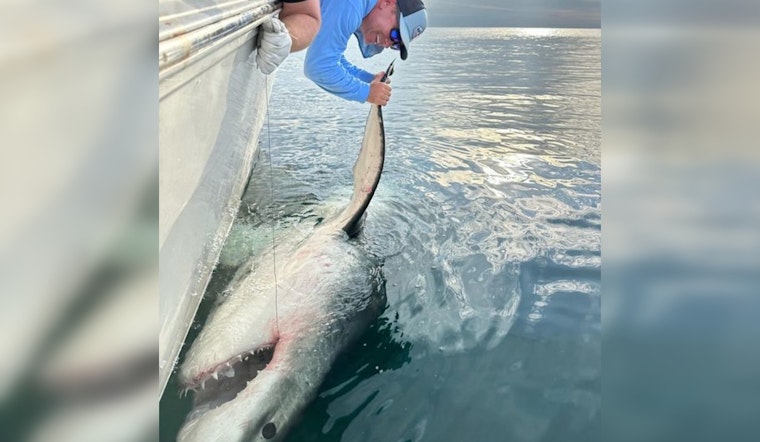
In an unprecedented aquatic journey that's rewriting the books on great white shark migration, a hulking 14-foot, 2,600-pound shark named LeeBeth has been tracked making a mammoth 2,000-mile trek from South Carolina to the Gulf of Mexico, marking her territory as the furthest west a white shark has been pinged in these waters.
A South Carolina charter fisherman, Capt. Chip Michalove, who tagged the colossal creature back in December 2023, expressed his astonishment at the shark's extensive travels, saying, "The big ones don't show up until January or February, I was really surprised to see the width of this one," in a statement to Fox San Antonio,
LeeBeth's journey seems to have been a continuous push forward, spurring researchers' excitement as she darted past the Texas shoreline, down to Corpus Christi, and then, just kept going she kept charging into Mexican waters as Capt. Michalove detailed for Yahoo Lifestyle.
Partnered with the Atlantic White Shark Conservancy (AWSC), Michalove's tagging initiative with LeeBeth has become the "home run" of their white shark research efforts – capturing significant data to aid in understanding the species' migratory patterns, "She kept going. She kept charging. And she's also the first one that went into Mexico," Michalove told Yahoo Lifestyle detailing the shark's unprecedented comportment.
Recorded with a satellite-tagged camera that detached after 24 hours, which crucially records the shark's underwater dealings by the second, researchers get a snapshot of LeeBeth's life beneath the waves, the data she's collecting she's a great pinging shark because she spends a lot of time on the surface because that's what makes her satellite connect, Captain Michalove explained to Fox San Antonio, emphasizing her consistent tagging results that have become an integral part of his daily routine.
Though the route from the cooler northern Atlantic Ocean to the warmer southern waters is a known migratory pathway for great whites, LeeBeth's venture to the western Gulf sets a new bar – and perhaps, as the waters begin to warm, she might take the research a further step north: "She's traveling to areas that we've never had before," said Michalove, and with seasoned expectations, eyes will be on the satellite tags for her next move back up north, potentially to New England or Canada.









